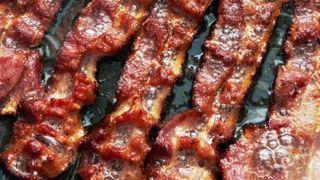Does the Dukan Diet work?
The Dukan Diet promises rapid weight loss, but what is it, and more importantly, does it work?

Any diet that promises rapid weight loss is bound to make waves, which may explain why the popularity of the Dukan Diet has endured, despite its controversial methods.
As well as rapid and substantial weight loss, another appealing factor about this high-protein, low-carb diet is that you can eat as much as you want of certain foods – and, let’s face it, eating unlimited amounts of food and still dropping fat is what everyone dreams of in a diet. Best of all, two of the four stages of this diet are maintenance stages, meaning Dukan is designed to be a way of life, rather than a short-term fix.
However, it’s not all rainbows and bacon strips. In 2011, when Dr Pierre Dukan tried to sue a nutritionist for libel, he lost the case spectacularly when it was revealed that 80% of people following the diet gained back all the weight they lost within four years. It was also claimed the diet could cause heart disease and breast cancer, which is reminiscent of the severe health warnings that plague the Atkins diet.
The method
The diet’s four stages begin with an ‘attack’ phase, which is as dramatic as it sounds. This rapid weight loss stage of the diet is when only foods from the list of 100 protein-heavy ‘free’ foods, such as lean meat, poultry, fish, shellfish, vegetarian proteins, fat-free dairy products and eggs can be eaten, as well as a little oat bran. This means there is very little carbohydrate in the first stage so expect, ahem, some toilet troubles thanks to a lack of fibre.
The next stage is the ‘cruise’ phase, when you can add 32 non-starchy vegetables to your protein and oat bran diet on alternate days. This might not make the diet much more exciting, but at least it adds some vitamins and carbs. The aim of this phase is to gradually take you to your natural weight. Dr Dukan advises that during these short phases, you supplement with a multivitamin.
The third phase, ‘consolidation’, allows you to gradually add foods that have been previously forbidden and allows two cheat meals a week and one pure protein day. Understandably, after so much restriction, it’s easy to go on a carb binge during this stage and gain all the weight back.
Finally, the ‘stabilisation’ stage is designed to be followed for the rest of your life. You’ll eat oat bran every day, move regularly and keep one pure protein day once a week. If you can stick to it, the theory is the weight will stay off forever.
Get the Coach Newsletter
Sign up for workout ideas, training advice, reviews of the latest gear and more.
The rationale
The body digests protein slowly, which is why it makes you feel fuller for longer. By keeping to a high-protein diet, you work harder to digest food and, gram for gram, protein is lower in calories than fat (it has the same calorie content per gram as carbohydrate but is better at making you feel full).
Dukan or not Dukan?
The restrictive first two phases may be a little extreme for people who have a lot of weight to lose and have to remain in them for weeks or months. Eating nothing but meat, fish, eggs and a limited number of vegetables can make it hard to be creative or excited about mealtimes. It’s also concerning from a health point of view because elimination diets lead to nutrient deficiencies and, potentially, more serious health problems. Short-term weight loss success is almost inevitable but, however much we like the idea of unlimited bacon, sticking to the diet long term may be difficult and unhealthy due to its restrictions. Plus, although it promises freedom there are actually a lot of rules to follow, making it far more likely that you’ll fall off the wagon than if you just generally take a sensible approach to your nutrition.
So does the Dukan Diet work if you need to lose weight? Yes. But whether it continues to be effective is – like most strict, prescriptive diets – completely down to the strength of your willpower.
Check out dukandiet.co.uk for more information.
Gaby Doman is a strength-training obsessed health and fitness writer who trained at the American Council of Education.

